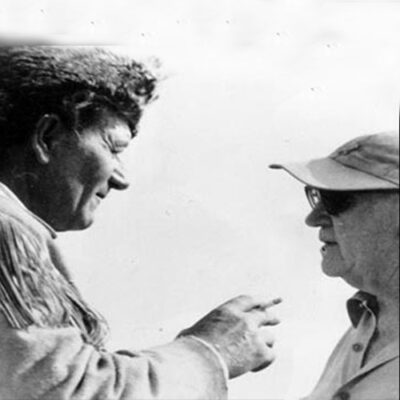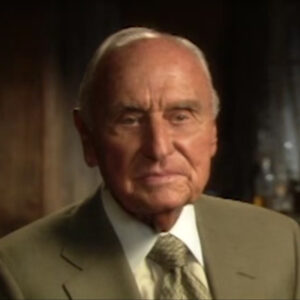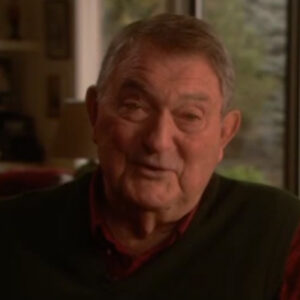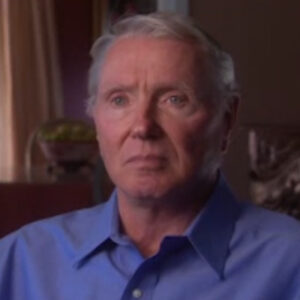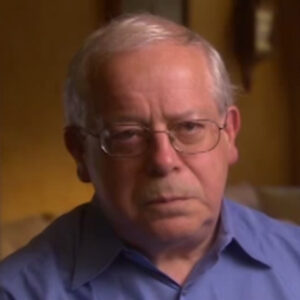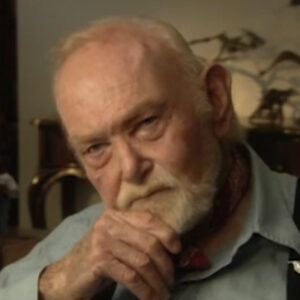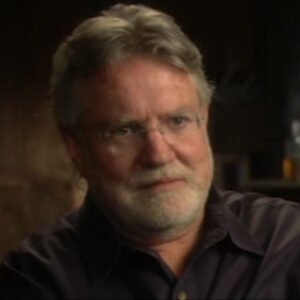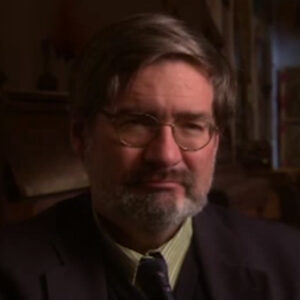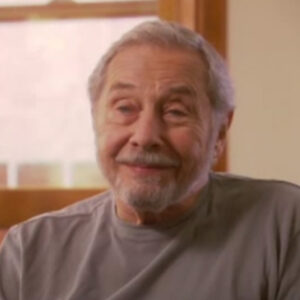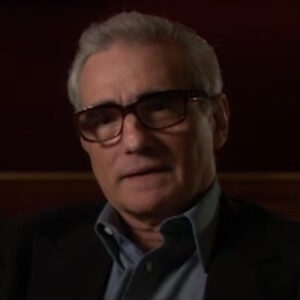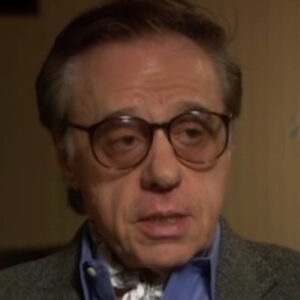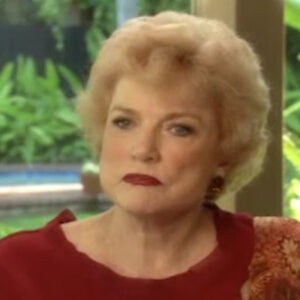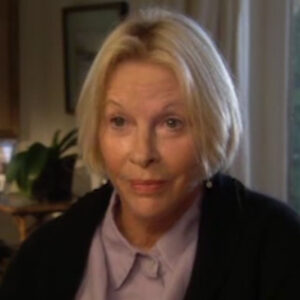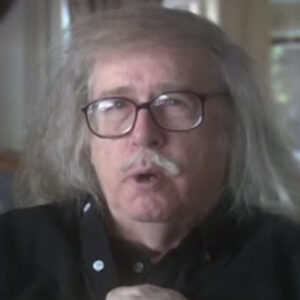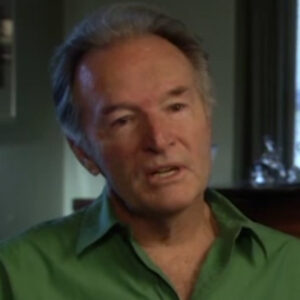Speaker Once done for this great American. What’s your reaction? Who was John Ford?
Speaker Well, for a man who presented himself as a as a simple Irish fellow, he was, of course, a very complex guy for a certain age group of cinephiles and cineastes. He’s very important. And some of those people carry on that affection well into their maturity. He was a great images of the American West, and those are immortal images, many of which center around, as everyone knows, Monument Valley and their breathtaking, they suggest the wildness of the landscape to be tamed. The same time, they suggest the smallness of the Tamar’s, the people heading west, the pioneers they make then the triumph of the pioneering spirit, the greater I mean, you know, because they’ve, you know, symbolically overcome these mighty landscapes in which are hostile Indians and Bushwackers bandits, all kind of people who, you know, make the journey so perilous. I think that’s all fine. And we shouldn’t confine Ford just to Monument Valley, made a lot of other kinds of pictures.
Speaker I do feel I’m not a great 40.
Speaker And let me put it that way.
Speaker I do feel that there is an awful lot of sort of.
Speaker Irish sentimentality in his presentation of these people, I mean, you know, even in the movie, as good as Fort Apache is, you know, the action stops in the the Irish non-commissioned officers are crooning. They’re you know, there’s there’s sentimental Irish songs down in the barracks and all that stuff and led, of course, by Victor McLaglen. And I find this stuff tiresome.
Speaker I find it to me. I don’t get any feeling from it. It’s almost as if he feels in his relationship to the popular audience that he needs to do that. Even in a picture as potentially great as the searchers is, he stops to have a comic fight. You know, a Jeffrey Hunter has back home when they come back from searching for the girl is just ghastly. Comic turn with a chubby Indian woman who’s conceived a sort of mad passion for Jeffrey Hunter. John Wayne. There’s a lot of bad to me, almost semi racist jokes going on about that relationship.
Speaker And here is this really noble and terrifying and tragic story proceeding at one level. And here’s her junk going on underneath it, as if to say, well, maybe this is maybe this material is too dangerous for a popular audience member.
Speaker Throw some stuff in here to, you know, soften the blow, soften the atmosphere.
Speaker And people who love Ford, you know, discount that so well, you know. Yes, but what at the imagery and it is simply in that pictures of the searchers in particular was mind blowing imagery.
Speaker But I, I don’t think he gets away with it even.
Speaker And I do respect, you know, say, two thirds of that movie, but it’s much more endemic, say, in the cavalry, westerns and so forth. And I will say his taste in music was just execrable. I mean, the Red River Valley was playing. And, you know, I just so I’m in a difficult spot with Ford, you know? I mean, I do respect some of his gift. And and then I just wonder sometimes what the hell he was thinking about.
Speaker You know, what we ask this question was first generation Irish American came from the. Despise. Yeah, people, you know, he becomes involved and probably the first mass medium of communication and he becomes in a way, as a director, the voice of the immigrant community. You know, I mean, this is about the immigrants and stuff.
Speaker Sure. I mean, was he we I mean, we see that voice. I mean, is that true? What I’m saying about.
Speaker Well, certainly it’s certainly true that the Irish in the early portion of the 20th century were amongst the most downtrodden classes in America and not so very different from the Jews. And both could cause far ahead of American blacks in their what they were allowed and permitted to do by the society, but I think typical Ford, he was I will say for him he was, you know, within the limits of what the studios offered. He offered actors like Woody Strode good roles in his movies. He was in those ways. He was a very mixed figure, you know. I mean, he was a harsh taskmaster as a director. I think he was an equal opportunity abuser of his talent. You know, I mean, the stories coming out of John Ford, SACEUR, generally horrendous.
Speaker I mean, he just you know, he didn’t care who the person was.
Speaker He would just be mean, the publicly degrading to his actors and technicians and so forth.
Speaker Not entirely nice man in my opinion.
Speaker And I think in everyone’s opinion, he was the chronicler of America because he loved American history. He loved him. He loved the Civil War. Yeah. Was he really our first chronicler of American past? It was a real it was a new thing.
Speaker Well, I don’t know about that exactly in the movies at that time.
Speaker And Ford, you know, Ironhorse aside, came into his own really as a director, I think in the late 30s, you know, or mid 30s. I mean, probably the informer was the film that people stopped and said, wow, this is an interesting major town. And then, of course, stagecoach and onward from there. In that period, there was an enormous throughout movies, there was an enormous interest in history of all kinds. I mean, there was this thing in the 1930s, an awful lot of British history being told in movies, you know, usually British colonial history, because it offered, you know, action and natives versus the colonizers, that kind of thing. But there was an enormous amount of American history. I mean, they even made, which would be unheard of in modern day America. Movies about the American Revolution, lots of movies about the Civil War, lots of movies, of course, about the Indian fighting West.
Speaker It was an era of great historical attention. Now, that may have been because of the Depression and because it was a offering escape to people and be offering, ah, an opportunity to not comment upon the terrible contemporary difficulties America was dealing with.
Speaker It was much easier kind of escape into the past and, you know, and show us noble and going forward and, you know, American gung ho spirit.
Speaker So I think I don’t think Ford was unique of his generation of directors in, you know, focusing on on the American past. So, yeah, he is one of the leaders in doing that.
Speaker For one, it is worth it.
Speaker I mean, he was in the what was the influence they had on Ford as a direct.
Speaker Ford also claimed, as well as being in the Klan. I mean, it’s one of those planes who can tell you all at once, but I suspect he was.
Speaker And he also claimed to have been at the Los Angeles that’s the world premiere of The Birth of a Nation and have been, you know, just swept away by the enthusiasm of the audience for that movie.
Speaker You can see certain things, the one simple example, I mean.
Speaker Ford and Griffith both, you know.
Speaker Rail fences, Camarillo against the fence, the rail stretching kind of off to the Infiniti line, you know, that kind of thing, and it’s something you can replace with something about looking up at galloping horses and all that kind of stuff. I mean, it’s kind of basic grammar of film, if you will. But Andy Griffith was pretty good at that sort of thing, and certainly pretty largely in advance of his particular era. You know, the teens of the century, the early 20s.
Speaker And I suppose we’re all influenced by what we see as kids, you know, as young men or young women. You know, it’s just, you know, that seems great to us. And it’s what I said, you know, at the outset, the things you see when you’re 10 or 12 years old just make a huge impression on you.
Speaker And if Ford was a young man and wishing to be in the business and seeing, you know, this great corrupt masterpiece of of of Griffith, he must’ve taken from it.
Speaker I think we’re dealing, you know, also in both cases with this is this is unprovable assertion. I think in both cases we’re dealing.
Speaker Searching for where to put this as politely as possible. We’re dealing with men who are limited by the common racism and prejudices of their moment.
Speaker You know, we expect of artists that they will rise above common humanity. They will have a larger and more generous vision than the ordinary citizen is often not the case now that smaller visions. I mean, it’s really true.
Speaker And I think that both Griffith and informed to a lesser extent for it had a not very generous vision when it came to other races, other spiritual values, other things than their own limited view of what was noble and great.
Speaker Ford had this very strong relationship with Harry Carey Senior. Yeah, from 1970 twenty five. Yeah, yeah. But he really used Harry Carey after that except the Shark Island. Yeah, yeah. Yeah.
Speaker That seemed to be sort of Ford’s particular style of working with people without it falling out.
Speaker So you get down on people.
Speaker I think George Bancroft was and I got a little from a Ford regular and he was gone suddenly from the Ford company, could never figure out why. And there were other actors like that necessarily leading actors, but actors who are sort of part of the Ford stock company. And he would get angry or distraught with them and they would not appear in his pictures. Then he might bring them back, you know, after a period of anxiety. But I think it was drink. I mean, I honestly do.
Speaker I think that he would get into some kind of and he was a heavy, heavy, heavy, heavy drinker. And I think he would get into these.
Speaker Stupas, they would lead to ranges because the victims of these things never quite figure out what happened, you know, they didn’t know what they’d done to possibly offend him. And, you know, there are always these stories of, you know, he would take out because the guy didn’t he didn’t like his boots are going to like his hat or, you know, he didn’t show up on the set and he didn’t want he didn’t like the costume.
Speaker He would yell and slap around and make a huge fuss about stuff like that. I’m pretty sure I would not personally have much cared for John Ford, you know, although I did meet him once and he was his old man and his bad you know, he died, I think, three years after that. And he was very kindly. And he I was interviewing him for my book about GW Griffith, and he was, you know, very sweet, you know, benign. But I liked him, I mean, in that moment.
Speaker But, you know. Well, his biggest his biggest star. Stock company was way off.
Speaker Yeah, what was the relationship between Ford and the curious, the curious one?
Speaker Um.
Speaker I think there was something on Wayne’s part was slightly masochistic about it, but I really do. I mean, there is there’s a famous story about the movie I happen to think is is Ford’s best film, which is they were expendable. I think that’s a really, truly great movie. Absent from it are those sentimental gestures that I so deplore in Ford movies. It’s a sort of him to American doubtfulness, sports, P.T. boat squadron and Philippine’s at the outset of World War Two. And it’s about them just getting the crap kicked out of them by the Japanese and and about their decimation, you know, one by one, the sailors on the boats and the boats themselves are. And so finally, they’re fighting on land. They have no more boats.
Speaker They’ve treated as fire across the Pacific is their decimated boats will carry them and they’re about to fight on land and. As the picture ends and two of them are allowed to escape and go to Australia, the song Take MacArthur on its final journey from the Philippines. So that’s too much plot.
Speaker But anyway, the picture was quite wonderful in showing the man accepting this really dreadful fate that was being meted out to them by the vastly superior forces of the Japanese at that stage of the war in that part of the Pacific. And there’s a kind of grim. Doubtfulness to that movie, I find very moving and as I say, is absent any kind of 40 in cinema. I mean, Donna Reed, for example, plays a nurse who was attracted to the John Wayne character, who’s the second in command.
Speaker And it happens that she. It’s either captured or killed by advancing Japanese, and he gets word of that in the way that scene is handled.
Speaker It’s just wonderful. I mean, you know, you can see what’s his fear for her and the recognition of what is her faith and yet his refusal to. Acknowledge that any.
Speaker Sentimental or God knows, break down sort of way. I mean, it’s very good, very good film, I think.
Speaker Anyway, on that picture, Robert Montgomery was the lead, along with John Wayne, who is the commander of the squadron, and he had been in the war. Montgomery and John Wayne had not been.
Speaker And he just rang unmercifully on Wayne comparing him invidiously and we had not particularly been a hero or anything like he just served his term. He’d been an officer in the Navy. And it got so bad that Montgomery had to go to Ford and say, hey, you know, we’re making a picture here. I was no big hero. You know, let’s just stop this. I can’t stand being on on the set listening to this, you know, and it’s it’s devastating. The morale of everybody around us is it’s horrible for Duke, you know, and I guess he pulled off at that point. But you know that that was not untypical of John Ford on the set with the way he went on to make more films and probably.
Speaker Yeah, yeah. All the people I talked to, he seemed to take a lot of these things out of it.
Speaker It’s a curious thing. I remember talking to Michael Journalese now late son, and we were talking I can’t remember the Ford Wayne picture we’re talking about. And I sort of let slip me not really meaning to sort of a not entirely positive opinion about John Ford. And he said, oh, that’s all right. He said, I didn’t like him either.
Speaker And he said he wants to express that opinion to his father, to John Wayne. And he says, oh, that’s all right. Poppy loves you. You know, he loves you.
Speaker And Michael said to me, but sure. In a funny way of showing it or expressing it, you know.
Speaker Directors, of course, have to have command and they assert that in. Numerous ways, but I am, you know, going through movie history, I don’t know of any who were so often abusive as as John Ford was, uh, you know, and on the record, you know, there maybe, you know, off the record guys pulling people aside, saying, listen, if you do what I did or how far.
Speaker But, you know, this is always public denunciations and calling into questions of manhood and talent and all that stuff.
Speaker So I don’t see the abuse of women. But one of the guys I don’t know where that came from other than alcohol, honestly. And of course, it became, you know, really disastrous when we got out on Mr. Roberts.
Speaker You know, I mean, that that was, you know, a travesty had to be replaced.
Speaker And, you know, and he was he was really out of control. You know, I think it was a case, that case everybody was on the picture. So it was just drink. I mean, he just was gone. You know, I think he actually hit Henry Fonda with his weight.
Speaker So so, I mean, such so beholden to Ford because he felt it was because of Stagecoach.
Speaker Well, it’s funny, you know, because it was Raoul Walsh who actually discovered John Wayne and gave him a stage name, you know, I mean, as he was reading a book about the revolutionary general man, Anthony Wayne, you know, and I thought that would a great name for Marion Morrison, which was not a good name for a movie star. And so, you know, you can’t call him a discoverer of him. And Wayne had a long time in the wilderness.
Speaker You know, all of Ford had known him as a prop man when he worked for Ford Pictures, you know, at Fox. Yeah. But, you know, it was Raul who gave him his first big part and the big trail, and he saw the good man. I mean, he’s you know, he’s not an actor yet, but he’s he’s got a wonderful presence, kind of a naive, sweet young guy presence.
Speaker Then he certainly worked in a lot of small parts and big pictures and big parts and small part small pictures in those days, and he used to say that he thought he had established himself and made an audience for himself before he got the stagecoach that, you know, there was an audience waiting for him to be in a major film. And, you know, it is a mystery. There are two mysteries there. Why would John Ford be abusive to an actor who really was in the process of becoming, you know, his meal ticket? Really? And the other is, why would John Wayne, who was in the process of becoming what was probably the most powerful movie star of his era, take this abuse from his nasty old man.
Speaker And I’ve never had anybody explain it to me in any way that made any kind of coherent sense of, you know, maybe it was resentment of an Irish guy for an Anglo guy, maybe it was the immigrant versus somebody who’d been here a while.
Speaker Maybe it was for a small man and a big, handsome man.
Speaker Maybe it was a resentment of I made him. And yet, you know, everybody knows who he is and they don’t know who I am or I don’t know where those resentments came from. Maybe it’s, you know, John Wayne, despite, you know, his you know, so many people agree. Just politics was a very nice man and people liked him, you know, I mean, upon meeting him and he was good natured. He was a great chess player. He was a good conversationalist. He was all things that John Ford was not the only thing. He was the only thing that he wasn’t in for. Ford was kind of a liberal Democrat, you know, politically.
Speaker Which is might be a little different. Yeah.
Speaker Ford was well, I mean, in a certain sense, Wayne and Ford were opposites and, you know, one way they were opposite was that, you know, when he was rock ribbed conservative doesn’t begin to cover the subject, whereas Ford was at least through the Adlai Stevenson era, a liberal Democrat, you know, amidst all these wains and ward bonds and ultra conservative Hollywood types, which was kind of an interesting thing about Ford, maybe just.
Speaker You know, some people need contentiousness, they just need to have attention around them.
Speaker They think it’s and maybe it is maybe it makes for an edginess that on film translates into something that’s useful for them. See, Henry Fonda would be another guy who did a lot of pictures with Ford and and did them very, very well.
Speaker I mean, he played Lincoln for him and he played the colonel Thursday.
Speaker It was on Thursday who was a terrific character in Fort Apache. And he played Tom Joad for him.
Speaker And so it’s and he seemed, oh, that’s so interesting. You know, Ford was a friend, was a very strong guy, and he was in particular an actor who was very conscious of his own limits as an actor and director who tried to push him beyond his limits. He would get very tense with them. And I suspect the Ford sort of understood what Fonda could do and what he wouldn’t do and just stuck to that line. Maybe he thought maybe he thought Wayne could do more than he could do. There’s a possibility that, you know, because I’ll tell you, talking about the searchers, whatever you think of the searchers, there’s one thing you can’t dispute. The performance by Wayne is a towering performance. I mean, it’s as good a piece of screen acting as I know of, you know, in the broadest, you know, I mean, the range in that man and the way he sustains it through the picture and is just wonderful. I mean, the pictures really running on Wayne’s range. And, you know, we have seen we had previously seen Wayne be impatient. We’ve seen him be, you know, cranky with tenderfoot and stuff like that. But we’ve never seen that kind of force from from within.
Speaker And I don’t know what that means in terms of the Wayne career or his career with Ford.
Speaker But, you know, maybe that’s the picture in which. He most did. What possibly Ford wanted from him, you know.
Speaker That’s a theory that occurred to me just as I was sitting here talking this notion that maybe he wanted more of Wayne than Wayne was willing to give, because it’s one of the things that actors do. I mean, they do find their limits and they do work within them and they are reluctant to move beyond them because that’s worked for them and it’s made them rich, has made them famous. And, you know, so you never can tell.
Speaker So you can never tell how much Ford really knew either. You know, how shrewd was he? I’ve read a number of biographies of Ford and, you know, there’s a lot of admiration in them, but there’s also not a lot of close judgment about.
Speaker Who and what he was, you know, I would think he would have to be a very shrewd man to be successful as long as he was successful, obviously, as a director.
Speaker Yeah, that’s true. The best directors of that era, you know, guys like Howard Hawks, Hitchcock.
Speaker For these men.
Speaker We’re incredibly shrewd in the way they manage their way through the studio system as it was constituted up to the mid 50s or late 50s.
Speaker They appeared to play the game, and yet they always got what they in particular wanted.
Speaker You know, and some of the things I admire about people of that era, I mean, in other words, they didn’t especially feel the need to assert themselves as auteurs or artists or anything. I think they can’t conceive of themselves as craftsmen and as men hired. Yes, by the studio.
Speaker But as hirees guys wanted to do their own thing no matter what the studio thought they were doing. You know, it was that kind of a deal. And I think Ford was probably pretty good at that.
Speaker You know, maybe not as good as Hauck’s was, who was the brilliant master of that particular game. And maybe not as great as Hitchcock, who was also fabulous in playing a game.
Speaker I don’t know. But he did last a long time. I mean, that’s a long, long, long career.
Speaker You mentioned that one of your articles is where you mentioned that one of his most beloved films required.
Speaker That is one that you find not so good as a little piece of work, why?
Speaker I think of all of Ford’s work, I really think I love the quiet man more than any man.
Speaker The shared DOMEIER free of it, you know, I don’t like the story of a guy coming back. I don’t like his treatment of Maureen O’Hara and I don’t like all of you drag. Oh, I hate that. I just think it’s I think it’s you know, I’m not big feminist guy, but I mean, I just think it’s I think it’s unfunny and I think it’s on smart as moviemaking. And, you know, I don’t quite agree. Twinkled and stuff that’s going on in there.
Speaker You know, the Barry Fitzgerald. Oh, God, I just can’t stand that movie.
Speaker And I can’t understand why people like it.
Speaker I mean, you know, its devices are blatant. It’s it’s a crudely made, crudely devised movie. I just don’t get it, you know.
Speaker I think if I was, I was going to say it is often true that people aren’t just Mutriku people who get reputations for being sort of cranky and curmudgeonly.
Speaker The word curmudgeon is often applied to people who actually are mean snakes. But, you know, but people will prefer to think of them. Oh, it’s just an affectation is really sweet old guy, you know? So he’s curmudgeonly and people get that repute, you know, is not as mean and crazy as they like you to think or that outsiders think. And, you know, they have a special relationship with me usually, you know, or the two or three of us really understand him. So I think a certain amount of that goes into the fact that Ford was, despite his record of abuse of everybody who came near him.
Speaker Has this lovable reputation amongst a lot of his former players.
Speaker Oh, he wasn’t so bad and look how great the work was and all that.
Speaker No, I think there was a period that I think was probably Ford’s best period, which was the immediate post-war period, which I think begins with they were expendable. I think it includes the cavalry trilogy. I think it includes My Darling Clementine, which is pretty good, was pretty good street Western. And I think those movies, Clementine in particular, is a very nice movie about. Kind of the pioneering spirit, you know, this is a little raw town and they’re building this is a church and I love the scene, which is the church framed in by boards and various dance there. And it’s a really courtly dance and fond of this. Linda Darnell and Kathy Downs are following. And it’s a beautiful little scene of the beginnings of civil civilization, you know, with spread out behind them, you know, just dust and dirt and the mountains and the still further distance. I mean, it’s beautiful shot. And the whole thing of, you know, getting rid of the murder is Clanton’s who threaten the peace of this little community. I think it’s a very nice film.
Speaker And I think the cavalry Westerns, again, you know, these are hymns to. Those who brought peace and order to a disorderly place, and I think those are very good films and I think that since I think that’s the best sense that Ford had of America, I mean, my larger objection to him is, you know, it comes in that.
Speaker When the truth becomes legend, print the legend. I honestly do not believe healthy societies are created out of myths and legends.
Speaker I really am a realist and I really deeply believe that if we do not confront our racist past, are our exploitative or economically exploitative past all those things that we will not be for very long if we’ve ever been a great country, I mean, we’ll be a powerful country with being powerful is different from being a great country.
Speaker And I think these myths grow out of the ring saga are just myths.
Speaker And I, I really think they’re bad for us.
Speaker And I love Westerns and world Westerns since I was a wee tot. And and yet I do see what’s wrong about them and what’s bad about them. And, you know, I don’t think you should print the legend. I think you should print the damn truth. And I think as a mega printer of which, you know, that that’s something, you know, to be held against Ford. I mean, we’re now past personality and whether it was a menal master and how bad an alcoholic he was and all that, I mean, there were severe limits to his vision and to go on romanticizing.
Speaker Those visions and you can put together such a beautiful kind of clip show of Ford’s imagery, the horses going through the stream and the wagons going through the pass and the, you know, the cavalry coming down the trail, I mean, these wonderful images of just the bare bones of the American southwest. I mean, all great stuff, you know, and as pretty as it’s moving and all that. But the myth is put in front of that.
Speaker It’s not such a great one, you know, and it involves the subjugation of an entire race of people, involves pioneering by people who are just, you know, the dregs of you.
Speaker You know, there’s a lot of stuff in the Western myth that just isn’t something we want our children to be, you know, emulate emulating, you know.
Speaker So it’s really kind of fascinating to me because you hear John Wayne Kirby talks about, oh, Thursday.
Speaker Yeah. You know, that was that was no great man right up here.
Speaker And he hated on Thursday. You know, I’m responsible for decimating the command.
Speaker I mean, he is General Custer who did the same thing and became a great hero for so doing so complicated, because on one level, for this sort of he’s sort of reinforcing the myths that you and I, you know, I was like, it was the great president and this was that first George Washington like. And that’s what I wanted to see out there, obviously pointing to this notion of America as we should be.
Speaker So it’s it’s sort of a kind of a complicated thing. They have to say. It shows the reality of it. What does it say about America? What for the way that we see on the screen?
Speaker You could probably say that these are.
Speaker Myths of convenience, you know, there are shorthand, I mean, you know, if I say a myth, the myths are bad for us.
Speaker I I also understand that, you know, you’ve got to have some kind of something to look up to, you know, something that makes you, you know, rise above.
Speaker The poor getting and spending level of humanity, but in another way, if she were to deal with these myths and add some complexity to the myth, then it becomes an interesting thing to do and a worthwhile thing to. Now, you know, that’s easy for me to say. Here’s a simple man from Maine, an Irish guy who goes west and goes into the movies.
Speaker He’s not particularly well-educated. He may read American history, but he really does believe in and printing religion.
Speaker I mean, you know, he’s you know, that’s the line from a movie that someone other than John Ford wrote. But he said roughly the same thing in many, many other contexts in his life. So it’s asking quite a bit of this man, you know, to you know, so we mustn’t judge him by our modern standards, you know. But, you know, a movie, recent movie, I think is great as a Johnny Depp movie, and it’s called Dead Man. And I mean, it is a deliberate attempt to dismiss the myth of demystify and demystify the West and is absolutely the most fascinating movies ever. I mean, about 12 people in the United States of America saw it. But it’s well worth your DVD rental, folks. But it is it is something that is trying to attack.
Speaker And it is Robert Mitchum, his last appearance in the film.
Speaker And anyway, I guess what I’m trying to say is, you know, I’m sorry to say all these things about John Ford because, you know, in saying I’m in a certain sense trashing my own childhood, you know, nobody wants to do that.
Speaker I mean, I wish I wish the world were the world of the cavalry trilogy, you know? And but even I remember at the time, you know, I was only 12 years old when that movie came out, something like that. And I remember the time thinking I was ending this weird ending didn’t make any sense to me.
Speaker We just seen this guy act like a total imbecile for three quarters, four fifths of the movie. And now we have John Wayne saying, you know, now they’re looking at this painting, you know, as far first these last days of their nosebleed. And in reporters, he’s that’s the way it really was. Oh, yeah. That’s really that’s a wonderful representation of Thursday’s last debate.
Speaker And then he talks about all that and what a noble death he had found.
Speaker And, oh, I mean, at the time, you know, it’s over. And I said, I’m not getting this. I mean, he’s he’s really the bad guy in the movie. So why are we normally him now? I guess you could say that the Ford was Lane’s cards right on the table, wasn’t he?
Speaker He’s saying it’s my job to lie to you because I am a myth maker and you need this myth and I think you need this myth.
Speaker And and that’s. Dubious to me, but if you believe that, I guess you have to honor his belief, don’t you?
Speaker What would you say about the ending of the searches?
Speaker I mean, after three quarters of the movie where Wayne is hated, hey, and full of hatred and planning to kill Natalie Wood’s character, and then at the very end, let’s go home, Debbie.
Speaker Oh, I don’t believe the.
Speaker I don’t know now here I think you have to defend dear old Jack Ford, I mean, would the would we today in to all six tolerate John Wayne killing Natalie Wood in that moment?
Speaker I can’t I don’t think it’s I don’t think it’s possible we might tolerate, you know, a straight arrow and a look on his face.
Speaker Oh, thank God I don’t have to do this, but I don’t think there’s any other ending except the false ending, because you wouldn’t kill her because the lie isn’t about John Wayne’s character. I think the why is about that type of man and the amount of rage he was carrying in.
Speaker A lot of that rage is about her mother, a woman you can’t have.
Speaker So, you know, that’s factoring in to that moment of do I?
Speaker Don’t I you know, this was fascinating that, you know, three years later, he did have a dark ending to work together.
Speaker Yeah. Yeah. People do kill. Yeah. Young man, he kills the wife, right? Yeah.
Speaker Well, I think as the years went on, that’s true.
Speaker Almost everybody, you know, your vision does darken a bit. You know, life life gets harder and then you die, you know.
Speaker I mean, so but most Hollywood and I think it’s true for most Hollywood directorial careers, they just peter out, don’t they? I mean, there’s no, you know, boom.
Speaker Well, in last masterpieces, in American movies, I mean, it’s very hard to find a triumphant final movie in the annals of American film.
Speaker Yes. You know.
Speaker Family plot or it’s you know, it’s over. Yeah, it’s funny, it’s hard to say because European directors often manage to go out or something graceful at least, and touching. But that’s that’s not so true of American directors, probably because it’s more industrialized system kind of falling in the machinery and shoes. Yeah, I think they should have some sort of funds set aside in every studio. What guys do you know, small budget, last pictures that they want to do and not force them into this? You know, you got to do seven.
Speaker Yeah, seven million was who was really last shot.
Speaker Yeah. We talked about giving the Indians a break. It wasn’t that were right.
Speaker Is that why you want to do that stuff?
Speaker I suspect he did. I was reading some of the books about him. You know, he did this for eight years. He just begin to feel a little bit guilty about the treatment of Indians in his film because we’re typically just the other you know, they were people out there that were not fully human.
Speaker They were the others and they had to be dispensed with. So I think I think he probably did feel that he needed to make a portrayal of a sympathetic group of American Indians, you know.
Speaker Fifty nine, fifty nine way way to record the album. You never seem to escape the shadow of John Ford, you know.
Speaker Yeah. What was their relationship? I 50 with that with the major superstar, I it was a director who was in decline.
Speaker Yeah. I don’t know what the relationship was by that late in the game.
Speaker I was only what, three or four years after the searchers there were still making pictures.
Speaker I mean, we got that weird.
Speaker You have to help me out here. It was a weird hurricane movie with Donovans Reef wasn’t in that period that you’re talking about.
Speaker Were there any others that he did that were soldiers? Yeah, it was.
Speaker Sometimes I believe that. Yeah, I was way.
Speaker Yeah. Well.
Speaker Liberty Valance has some virtue. I think the problem with it is it’s so obviously studio bound. I mean, that means that means some outdoors in it, you know? But he was an old guy, and I think he probably couldn’t even go out of Monument Valley to do it. But it’s an interesting conundrum that’s presented in that movie. I like the I like the problem it presents. I like Lee Marvin a lot in the movie. I like John. I like I like Jimmy Stewart in the movie. It’s it’s just not a spacious enough film for the story it wants to. How I think Donovans Reef to me is sort of like a Rat Pack film without the Rat Pack.
Speaker It’s his own little personal rat pack. You know, they’re they’re just goofing their way through this film. You know, they’re out there on an island, probably half of the bay, half the time they’re shooting, you know, and, you know, and the horse soldiers is OK.
Speaker But he sure did better than that in his lifetime.
Speaker As I say, I really think that there is this little brief middle period of John Ford because I don’t really like his Abraham Lincoln, you know, the young Lincoln picture all that much in the pre-war years. And I don’t like Stagecoach all that much.
Speaker Um.
Speaker It has this fundamental flaw is that all these people are trapped in the stagecoach talking and the talk isn’t that interesting and they’re too little, too stereotypical.
Speaker You know, there’s the the tricky banker. There’s the drunken doctor. There’s the town hooker. There is a young girl who’s married to the noble cavalry officer and she’s pregnant and incomes.
Speaker The Ringold kid is great.
Speaker I mean, you know where the unions are trying to take over the stagecoach, all of the you know, somehow I would say so.
Speaker Well, Jack, why don’t they just shoot the horse, say I watch I come to think of it applies to a lot of movies. Why don’t they shoot the horses? And I think American Indians had any compunctions about shooting the horses. I’m saying. But I don’t like I think I think the talk is uninteresting in that movie and very cliched.
Speaker I think, you know, with the exception of the Indian attack and it’s not a very interesting movie in terms of its developing action. So I think Wayne is great in it. I mean, in the moment where Wayne, you know, appears twirling his rifle by the side of the road, I think it’s as one of the great star enunciations in the history of movies.
Speaker And people forget because, you know, we remember Wayne is his BFE older guy that we, you know, grew up with, that he was a handsome young guy. He was simply gorgeous, you know, and Ford takes full advantage of that handsomeness of Wayne in that context.
Speaker I wanted but I think his immediate pre-war period, I know stage was was a big hit and all that stuff.
Speaker But as I say, upon mature evaluation and I’ve just recently seen the picture in the last couple of years, I really don’t think it’s all that terrific. And then he was doing those.
Speaker Oh, the long voyage home is unwatchable, you know, I mean, is literally unwatchable.
Speaker Um, well, I, I saw a pretty bad print of it fairly recently, so I maybe I’m but I just think it’s talking in and uninteresting. So, so, so I guess overall, yes.
Speaker It’s kind of a mixed bag as a career. It’s not all that great. You know, if you. But then he made probably too many movies.
Speaker You know, he did say an interesting thing once and for where he said I’m a career man, meaning he didn’t want to be judged by, you know, a group of individual felt he would be judged on the long run of his career.
Speaker And we were supposed to pick out of that career, you know, his best work as a career man. And I suppose benignly, I would say he had a decent career. You know, I just don’t think he’s a great American filmmaker, you know, and I think it’s too easy to say that about him.
Speaker This is my next to last question. Many people consider for enlisting in World War Two a great range of patriotic duty.
Speaker I mean, was a between. Scrap it.
Speaker What do you think of this notion of this forty five year old man giving up a Hollywood career to serve his country for four years?
Speaker Jurors see the outtakes from December 7th.
Speaker I don’t suppose it was Ford’s fault. I mean, you know, he let his cameraman loose out there and he hired a lot of actors and they did this. Well, it wasn’t just recreations. There were a lot of recreations. And it’s very interesting.
Speaker Set aside Walter Houston playing Uncle Sam like, you know, insanity, you know. But even at the Pearl Harbor Memorial in Honolulu, where they’re playing a film True Story about the morning of December 7th, they’ve got fictional footage of the guys, you know, at a prayer service and they drop their prayer books and pick up their rifles. And I mean, this stuff is everywhere and it’s all fraudulent. I. He was printing legend’s left and right and winning his Oscars for it, I mean, the Midway thing is a joke. I mean, there’s one airplane, he’s doubling and tripling it and, you know, bringing it back and forth.
Speaker And it is true. He got one of the Japs dropped a bomb. But Midway was was never a battle. About Midway, the battle of Midway was fought way the hell out in the ocean between aircraft carriers that couldn’t actually see each other. So there’s no coverage in the Battle of Midway to speak of of the actual battle of Midway. So it an absolute fraud.
Speaker You know, that movie, I think, for during the war was really at its worst. I mean, just doing a sort of what should you call a propagandistic gesture so that that work is worthless. And even though he won, I think, two Oscars for him. Yeah. Yeah.
Speaker My final question for, you know, we all think of when you talk about it, when you speak of the wagon trains coming down the Pike River mine, great shot man, by the way, drive across the valley in the search or Pedro.
Speaker I mean, there’s a carriage again, way lap. Yeah.
Speaker What you hear is reputations of one of the great visuals filmmakers.
Speaker Is it a good reputation or is it just because, oh, John Ford was one of the greatest pictorials in the history of movies?
Speaker Without question, it’s the use to which the pictures are put, the word that makes the questions rise. You know, the rest of it is that the pictures are great, you know, and they have influenced now generation upon generation of filmmakers.
Speaker And I don’t think those filmmakers necessarily.
Speaker Look at the pictures in which the images appear or analyze what those pictures are saying they’re really just talking about.
Speaker Those images, you know, and I have no objection to that, you know, he belongs in some kind of pantheon of significant American directors. You know, if you criticize Ford, you have to criticize him in a fairly high level and say, well, what use are these images being put to and what myths are they serving?
Speaker And are those myths really myths that we wish to keep on propagating in the 21st century?
Speaker You know, I prefer myself.
Speaker Um, a more laconic kind of filmmaking, um, I don’t think. Let’s say.
Speaker If I were to pick some Westerns that I would prefer to Ford’s Western, I might pick Rio Bravo by Howard Hawks because I think it really has something kind of tough and interesting to say about getting together a group of people to oppose the bad guys in a in a small Western town. I might surely pick Clint Eastwood’s Unforgiven for its. You know, it’s it’s it’s realism is a sense that, you know, sherriffs and that weren’t just necessarily bad guys, they could be sadistic and that, you know, and the town horrors were not just beautiful creatures, but and all the stuff that’s real in that movie and I think wipes a little bit, erases a little bit the mythology of the West without that travesty and or satirizing and or any of that sort of thing. So that’s the kind of moviemaking I would prefer to the simple romanticism of Ford’s work and and certainly with the Irish balladry as he hires humor, you know.
Speaker And finally, what is the legacy of the Fort Wayne collaboration? I’ve also said I grew up so far, love.
Speaker Well.
Speaker I think this I thought most of my life.
Speaker I think John Wayne is a great actor, great screen actor. I mean, we’ve seen play Hamlet, but he’s a great presence and it’s a great, honest presence.
Speaker I mean, you know, there’s no duplicity in what’s going on there. And he is rooted in the earth. I mean, he he’s commanding that earth, that ground he walks on. And, you know, you see actors. Ronald Reagan was one when he was in a Western. He didn’t seem rooted.
Speaker He kind of seemed to be floating across that landscape. You know, something about Wayne, where he belongs in that place. And yet you also feel about Wayne and this was, I think, some of his genius. There was a slight awkwardness about him.
Speaker You understood that what he knew about the West was learned that he’d come there from someone somewhere else and had, through a hard study, painful probably in many instances have learned to master that land.
Speaker So he was, in a way, the perfect pioneering figure because he was nobody’s fool and nobody’s patsy. And he had mastered what he needed to master to survive in that place, which tended to make him a little cranky, which added a little salt of humor and even suspense in his character.
Speaker So I always thought that he was just a towering movie figure. And I remember, you know, in the 50s and I would say this and parties people start laughing at me. I didn’t say as well as I now say it, but because I’ve said it so often. But I think he is a great figure, an authentic, great figure in movies. And I think Ford, by contrast.
Speaker Probably will survive as the author of a number of images that will, I think is history moves become disconnected from their context. He will become a creepshow and we will honor him and all that. But I don’t think that we will have. Quite the reverence that we have, generally speaking, for him today, because I think people will begin critically to examine.
Speaker That word.

